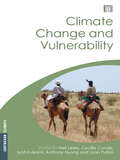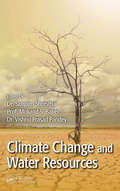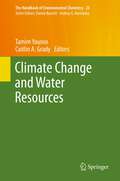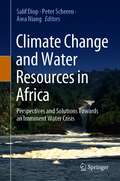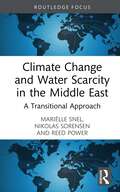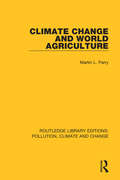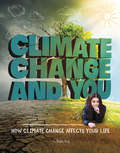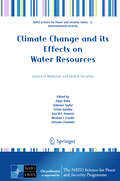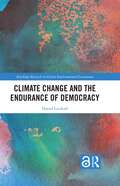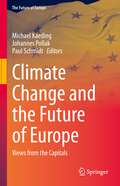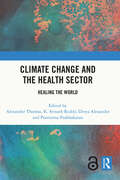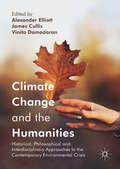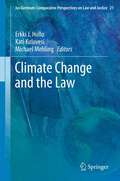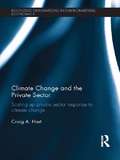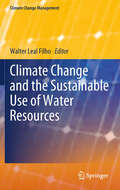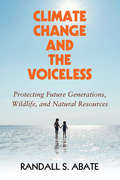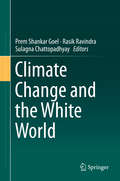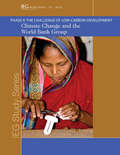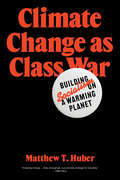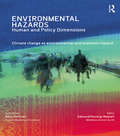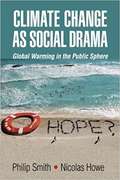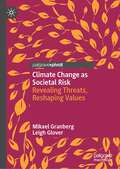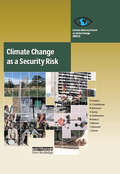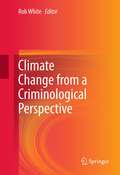- Table View
- List View
Climate Change and Vulnerability and Adaptation: Two Volume Set (Earthscan Climate Ser.)
by Neil Leary'Sound and solid case studies on vulnerability and adaptation have been woefully lacking in the international discourse on climate change. This set of books begins to bridge the gap.' Achim Steiner, UN Under-Secretary General and Executive Director of United Nations Environment Programme 'Important reading for students and practitioners alike.' Martin Parry, Co-Chair, Working Group II (Impacts, Adaptation and Vulnerability), Intergovernmental Panel on Climate Change (IPCC) 'Fills an important gap in our understanding ... It is policy-relevant and deserves to be widely read.' Richard Klein, Senior Research Fellow, Stockholm Environment Institute (SEI), Sweden The Intergovernmental Panel on Climate Change (IPCC) concluded in its 2001 report that much of the developing world is highly vulnerable to adverse impacts from climate change. But the IPCC also concluded that the vulnerabilities of developing countries are too little studied and too poorly understood to enable determination of adaptation strategies that would be effective at reducing risks. These authoritative volumes, resulting from the work of the Assessments of Impacts and Adaptations to Climate Change (AIACC) project launched by the IPCC in 2002, are the first to provide a comprehensive investigation of the issues at stake. Climate Change and Vulnerability discusses who is vulnerable to climate change, the nature of their vulnerability and the causes of their vulnerability for parts of the world that have been poorly researched until now. Climate Change and Adaptation covers current practices for managing climate risks to food security, water resources, livelihoods, human health and infrastructure, needs for effective management of climate risks, the changing nature of the risks, strategies for adaptation, and the need to integrate these strategies into development planning and resource management.
Climate Change and Water Resources
by Sangam Shrestha Vishnu Prasad Pandey Mukand S. BabelCovering the various aspects of water and climate change, Climate Change and Water Resources presents the principles of climate change science and its effects on earth's water supply. Utilizing the knowledge and expertise from well-known experts in the field, the text provides a broad outline of the many interrelated aspects of climate variations,
Climate Change and Water Resources (The Handbook of Environmental Chemistry #25)
by Tamim Younos Caitlin A. GradyThis volume presents nine chapters prepared by international authors and highlighting various aspects of climate change and water resources. Climate change models and scenarios, particularly those related to precipitation projection, are discussed and uncertainties and data deficiencies that affect the reliability of predictions are identified. The potential impacts of climate change on water resources (including quality) and on crop production are analyzed and adaptation strategies for crop production are offered. Furthermore, case studies of climate change mitigation strategies, such as the reduction of water use and conservation measures in urban environments, are included. This book will serve as a valuable reference work for researchers and students in water and environmental sciences, as well as for governmental agencies and policy makers.
Climate Change and Water Resources in Africa: Perspectives and Solutions Towards an Imminent Water Crisis
by Salif Diop Peter Scheren Awa NiangThe focus of this book is on the key water-related vulnerabilities to climate change in Africa, particularly in its most vulnerable areas, exploring potential management responses to such vulnerabilities. The African countries are particularly exposed and vulnerable to the negative impacts of climate change, with important impacts on water resources and hydrological systems, water availability, water resource management and sea level variations. Already, under various anthropogenic pressures, the status of water resources in Africa has been changing over the past decades, with decreasing water quality, falling groundwater levels, and variability in rainfall, both in terms of timing and intensity. Climate change will further accelerate the rate of change, affecting the ability of people and societies to respond in a timely manner. It is clear that there is no quick fix to the pressures imposed on water resources by climate change. Increasing the resilience of ecosystems and communities to extreme events such as flooding and drought, and integrating climate change risks and opportunities into development decision-making is indeed a key challenge, as much a technical climate-change one, as a political and developmental challenge. The book, in this regard, intends to contribute to the debate around climate change in relation to water resources management in Africa, and in particular inform policy decisions and actions that will improve governments’ and communities’ ability to manage the challenges of climate change and variability in relation to the aquatic ecosystems that they depend on. The knowledge collected in this book will benefit policy makers, researchers, as well as other stakeholders.
Climate Change and Water Scarcity in the Middle East: A Transitional Approach (Earthscan Studies in Water Resource Management)
by Mariëlle Snel Nikolas Sorensen Reed PowerAs water's significance as a geopolitical resource is poised to surpass that of oil, this book explores the adaptation of Water, Sanitation, and Hygiene (WASH) services in the Middle East to climate change challenges, leveraging the Humanitarian-Development-Peace nexus for a sustainable transition and resilient solutions. Delving into the humanitarian and development sectors across the region, the authors advocate for a transformative approach towards more innovative, integrated, and localized programming. It draws a parallel between the increasing global shift in humanitarian needs, as starkly revealed by the COVID-19 pandemic, and the ongoing devastation wrought by climate change, particularly through water-related crises such as flooding, drought, famine, and conflict. The authors stress the urgent need for adaptive and sustainable strategies that can swiftly respond to evolving climate challenges. This book argues that there is currently a window of opportunity for WASH practitioners to develop broader, multi-sectoral experiences to meet these challenges. Drawing on discussions with humanitarian and development practitioners and new contemporary case studies, this book analyzes the financial, institutional, environmental, technical, and socio-cultural considerations for creating sustainable WASH services in transition. The narrative emphasizes the urgent need for a Humanitarian-Development-Peace nexus approach, advocating for multisectoral collaboration and localization as vital to addressing protracted crises and climate change's escalating threats. It calls for a strategic shift towards organizations that merge immediate humanitarian aid with sustainable development, enhancing local capacities for effective, enduring solutions. The authors conclude by outlining practical actions for humanitarian and development organizations at the local, national, regional, and global levels to support effective integrated and transitional WASH programming in the future.
Climate Change and World Agriculture
by Martin L. ParryOriginally published in 1990, this book analysed the sensitivity of the world food system and looked at the variety of ways in which it would be affected by climate change. It describes the effects of climate change on agriculture, estimates the impacts on plant and animal growth and looks at the geographical limits to different types of farming. It also considers the range of possible ways to adapt agriculture and so to mitigate the disastrous consequences of climate change.
Climate Change and You: How Climate Change Affects Your Life (Weather and Climate)
by Emily RaijWhy should you care about climate change? Weather affects your everyday life and climate change can have major impacts. Discover how scientists study climate change, what current research shows, and what you can do to reverse its effects.
Climate Change and its Effects on Water Resources: Issues of National and Global Security (NATO Science for Peace and Security Series C: Environmental Security)
by Alper Baba Antonio Chambel Gökmen Tayfur Ken W.F. Howard Michael J. Friedel Orhan GündüzNational and global security can be assessed in many ways but one underlying factor for all humanity is access to reliable sources of water for drinking, sanitation, food production and manufacturing industry. In many parts of the world, population growth and an escalating demand for water already threaten the sustainable management of available water supplies. Global warming, climate change and rising sea level are expected to intensify the resource sustainability issue in many water-stressed regions of the world by reducing the annual supply of renewable fresh water and promoting the intrusion of saline water into aquifers along sea coasts, where 50% of the global population reside. Pro-active resource management decisions are required, but such efforts would be futile unless reliable predictions can be made about the impact of the changing global conditions on the water cycle and the quality and availability of critical water reserves. Addressing this wide spectrum of issues, a team of expert authors discusses here the impacts of climate change on the global water resources, the long-term resource management goals at global and local scales, the data requirements and the scientific and technical advances necessary to mitigate the associated impacts.
Climate Change and the Course of Global History
by John L. BrookeClimate Change and the Course of Global History presents the first global study by a historian to fully integrate the earth-system approach of the new climate science with the material history of humanity. Part I argues that geological, environmental, and climatic history explain the pattern and pace of biological and human evolution. Part II explores the environmental circumstances of the rise of agriculture and the state in the Early and Mid-Holocene, and presents an analysis of human health from the Paleolithic through the rise of the state, including the Neolithic Demographic Transition. Part III introduces the problem of economic growth and examines the human condition in the Late Holocene from the Bronze Age through the Black Death, assessing the relationships among human technologies, climatic change, and epidemic disease. Part IV explores the move to modernity, stressing the emerging role of human economic and energy systems as earth-system agents in the Anthropocene. Supported by climatic, demographic, and economic data with forty-nine figures and tables custom-made for this book, A Rough Journey provides a pathbreaking model for historians of the environment, the world, and science, among many others.
Climate Change and the Endurance of Democracy (Routledge Research in Global Environmental Governance)
by Daniel LindvallThis book explores the challenges climate change poses to the endurance of democracy, situating this theme within the context of the decline in global freedom documented since the early 21st century. It discusses how disaster events have historically affected human reasoning and agency and how the climate crisis is likely to influence democratic development in the future.Climate extreme events can provide opportunities for autocratic leaders to curtail rights and freedoms, but they can also create critical junctures where the social and political discourse within society is reshaped and where incumbent regimes are contested. The book illustrates how climate change may generate food insecurity, economic recessions and deepen socioeconomic inequalities. These effects may contribute to democratic backsliding but can also create new conditions for social mobilization. The democratic consequences of climate change are thus not primarily determined by the forces of nature, but by human responses and the social, economic and political conditions of the affected country. In the long-term perspective, however, climate change will have several negative effects on democratic stability. The book concludes that for human freedom and democracy to endure, modern society needs to be brought into balance with nature.This volume will be of great interest to students and scholars of climate governance, environmental politics, energy policy and global development.
Climate Change and the Future of Europe: Views from the Capitals (The Future of Europe)
by Michael Kaeding Paul Schmidt Johannes PollakWhile the ambitious objectives outlined in the EU’s Green Deal aim at making Europe the first climate-neutral continent by 2050, national implementation greatly varies depending on local geographies, history, culture, economics, and politics. This book analyses Member States’ and EU neighbours’ national efforts to combat climate change. It subsequently draws on these factors to highlight local challenges, tensions, and opportunities on the road towards climate neutrality. In the context of inter-country dependencies following Russia’s war against Ukraine, it addresses strategic questions regarding EU integration, the transformation of our economies, the reduction of energy dependencies, and public perception of the above. The book also makes concrete recommendations, in various policy areas, on how individual countries and the EU as a whole should deal with the climate crisis.
Climate Change and the Health Sector: Healing the World
by Alexander Thomas K. Srinath Reddy Divya Alexander Poornima PrabhakaranThe health sector is known to be one of the major contributors towards the greenhouse gas emissions causing the climate crisis, the greatest health threat of the 21st century. This volume positions the health sector as a leader in the fight against climate change and explores the role of the health system in climate policy action. It delivers an overview of the linkages between climate change and the health sector, with chapters on the impact of climate change on health, its connection to pandemics, and its effects on food, nutrition and air quality, while examining gendered and other vulnerabilities. It delves into the different operational aspects of the health sector in India and details how each one can become climate-smart to reduce the health sector’s overall carbon footprint, by looking at sustainable procurement, green and resilient healthcare infrastructure, and the management of transportation, energy, water, waste, chemicals, pharmaceuticals and plastics in healthcare. Well supplemented with rigorous case studies, the book will be indispensable for students, teachers, and researchers of environmental studies, health sciences, and climate change. It will be useful for healthcare workers, public health officials, healthcare leaders, policy planners, and those interested in climate resilience and preparedness in the healthcare sector.
Climate Change and the Humanities: Historical, Philosophical and Interdisciplinary Approaches to the Contemporary Environmental Crisis
by Vinita Damodaran Alexander Elliott James CullisThis volume of essays fills a lacunae in the current climate change debate by bringing new perspectives on the role of humanities scholars within this debate. The humanities have historically played an important role in the various debates on environment, climate and society. The past two decades especially have seen a resurfacing of these environmental concerns across humanities disciplines in the wake of what has been termed climate change. This book argues that these disciplines should be more confident and vocal in responding to climate change while questioning the way in which the climate change debate is currently being conducted in academic, political and social arenas. Addressing climate change through the varied approaches of the humanities means re-thinking and re-evaluating its fundamental assumptions and responses to perceived crisis through the lens of history, philosophy and literature. The volume aims thus to be a catalyst for emerging scholarship in this field and to appeal to an academic and popular readership.
Climate Change and the Law (Ius Gentium: Comparative Perspectives on Law and Justice #21)
by Michael Mehling Kati Kulovesi Erkki J. HolloClimate Change and the Law is the first scholarly effort to systematically address doctrinal issues related to climate law as an emergent legal discipline. It assembles some of the most recognized experts in the field to identify relevant trends and common themes from a variety of geographic and professional perspectives. In a remarkably short time span, climate change has become deeply embedded in important areas of the law. As a global challenge calling for collective action, climate change has elicited substantial rulemaking at the international plane, percolating through the broader legal system to the regional, national and local levels. More than other areas of law, the normative and practical framework dedicated to climate change has embraced new instruments and softened traditional boundaries between formal and informal, public and private, substantive and procedural; so ubiquitous is the reach of relevant rules nowadays that scholars routinely devote attention to the intersection of climate change and more established fields of legal study, such as international trade law. Climate Change and the Law explores the rich diversity of international, regional, national, sub-national and transnational legal responses to climate change. Is climate law emerging as a new legal discipline? If so, what shared objectives and concepts define it? How does climate law relate to other areas of law? Such questions lie at the heart of this new book, whose thirty chapters cover doctrinal questions as well as a range of thematic and regional case studies. As Christiana Figueres, Executive Secretary of the United Nations Framework Convention on Climate Change (UNFCCC), states in her preface, these chapters collectively provide a "review of the emergence of a new discipline, its core principles and legal techniques, and its relationship and potential interaction with other disciplines."
Climate Change and the Private Sector: Scaling Up Private Sector Response to Climate Change (Routledge Explorations in Environmental Economics #40)
by Craig A. HartClimate Change and the Private Sector explores the challenges of transforming our energy infrastructure to become carbon neutral and adapting to climate change in the twenty-first century. It examines the critical role that the private sector must play in these challenges. To transform the global energy complex to be carbon neutral within a time frame designed to prevent irreparable damage to the environment presents unprecedented challenges. The private sector must deploy financial, material, and engineering resources on a scale never before undertaken — with government providing leadership, removing barriers and supporting industry efforts through policies that mobilize markets to achieve environmental objectives. A key element of supporting private sector initiative to address climate change is policies that help form and sustain markets that supply, finance and generate demand for the technologies necessary to transform our energy infrastructure. The characteristics and examples of these policies are explored in detail. Companies that respond to these challenges both by mitigating greenhouse gases and adapting to climate change will enhance their own competitiveness and contribute to society in the process. Companies that embrace the challenge to decarbonize their manufacturing operations, whether in response to regulation (or the threat of regulation) or market opportunities, invariably discover ways to improve their operations in the process that could potentially enhance their ability to produce better products, more efficiently. The book explores examples of companies that have redesigned their products and manufacturing processes, and in doing so transformed themselves and reshaped their industries. As in the case of companies mitigating greenhouse gas emissions, companies that lead their industries in adapting their own operations to a changing physical environment are more likely to ensure their resilience in a changing business environment. This book provides business, policy and academic audiences with an in-depth exploration of the subject, and a practical guide to action.
Climate Change and the Sustainable Use of Water Resources (Climate Change Management)
by Walter Leal FilhoThe book explores the geo-chemical, physical, social and economic impacts of climate change on water supplies. It contains examples and case studies from a wide range of countries, and addresses the need to promote sustainable water use across the world.
Climate Change and the Voiceless: Protecting Future Generations, Wildlife, and Natural Resources
by Randall S. AbateFuture generations, wildlife, and natural resources - collectively referred to as 'the voiceless' in this work - are the most vulnerable and least equipped populations to protect themselves from the impacts of global climate change. While domestic and international law protections are beginning to recognize rights and responsibilities that apply to the voiceless community, these legal developments have yet to be pursued in a collective manner and have not been considered together in the context of climate change and climate justice. In Climate Change and the Voiceless, Randall S. Abate identifies the common vulnerabilities of the voiceless in the Anthropocene era and demonstrates how the law, by incorporating principles of sustainable development, can evolve to protect their interests more effectively. This work should be read by anyone interested in how the law can be employed to mitigate the effects of climate change on those who stand to lose the most.
Climate Change and the White World
by Rasik Ravindra Prem Shankar Goel Sulagna ChattopadhyayThis book showcases the results of studies pertaining to climate changes in the Polar Regions - Arctic-Antarctic-Himalaya. It discusses the significant variations due to thinning of sea ice in the Arctic, insights on the first Indian Arctic multi-sensor mooring (IndARC), political context of major geological and tectonic features of Arctic Ocean, climate change and its predicted impacts on fisheries and coastal communities. The book also contains the work pursued under the National Mission for Sustaining the Himalayan Ecosystems, aiming towards strengthening the capacities of farmers through appropriate Lab-to-Land intervention to combat climate change issues. Discussions on various models like WRF (Weather Research and Forecasting), Regional Climate Model (RegCM4) pertaining to Himalaya have been highlighted to gain more insights on climate change.
Climate Change and the World Bank Group
by The World BankThis study from the Independent Evaluation Group draws lessons for development and climate change mitigation from the World Bank Group's far-reaching portfolio of projects in energy, forestry, transport, coal power, and technology transfer. Reviewing what has worked, what hasn't, and why, the evaluation's key findings include: Energy efficiency can offer countries direct economic returns that dwarf those of most other development projects, while also reducing greenhouse gas emissions. Tropical forest protected areas, on average, significantly reduce tropical deforestation, preserving carbon and biodiversity. Deforestation rates are lower in areas that allowed sustainable use by local populations than in strictly protected areas. Deforestation rates were lowest of all in indigenous forest areas. For renewable energy projects, long-duration loans have been important in making projects financially viable.. But at prevailing carbon prices, carbon offset sales had little impact on most renewable energy projects' rate of returns, and did not address investors' need for up-front capital. Technology transfer - broadly understood to include diffusion of technical and financial innovations related to low-carbon development - has worked well when the logic of piloting and demonstration is well thought out, and when grants are used to mitigate the risk of pioneering efforts.
Climate Change as Class War: Building Socialism on a Warming Planet
by Matthew T. HuberHow to build a movement to confront climate changeThe climate crisis is not primarily a problem of &‘believing science&’ or individual &‘carbon footprints&’ – it is a class problem rooted in who owns, controls and profits from material production. As such, it will take a class struggle to solve. In this ground breaking class analysis, Matthew T. Huber argues that the carbon-intensive capitalist class must be confronted for producing climate change. Yet, the narrow and unpopular roots of climate politics in the professional class is not capable of building a movement up to this challenge. For an alternative strategy, he proposes climate politics that appeals to the vast majority of society: the working class. Huber evaluates the Green New Deal as a first attempt to channel working class material and ecological interests and advocates building union power in the very energy system we need to dramatically transform. In the end, as in classical socialist movements of the early 20th Century, winning the climate struggle will need to be internationalist based on a form of planetary working class solidarity.
Climate Change as Environmental and Economic Hazard (Environmental Hazards Series)
by Boris PorfirievThe current policy for climate change prioritises mitigation over adaptation. The collected papers of Climate Change as Environmental and Economic Hazard argue that although efforts to reduce greenhouse gas emissions are still vital, the new policy paradigm should shift the priority to adaptation, with a special focus on disaster risk reduction. It should also consider climate change not purely as a hazard and a challenge, but as a window of opportunity to shift to a new sustainable development policy model, which stresses the particular importance of communities' resilience. The papers in this volume explore the key issues linked to this shift, including: ' Increasing research into the Earth Sciences, climate reconstruction and forecasting in order to decrease the degree of uncertainty about the origin, development and implications of climate change; ' The introduction of more binding and comprehensive regulation of both greenhouse gas emissions and adaptation measures, like that in the United Kingdom; ' Matching climate policy with that for disasters and mainstreaming it into overall development strategies. The volume is a valuable addition to previous climate change research and considers a new policy approach to this new global challenge.
Climate Change as Social Drama
by Philip Smith Nicolas Howe Smith, Philip and Howe, NicolasClimate change is not just a scientific fact, nor merely a social and political problem. It is also a set of stories and characters that amount to a social drama. This drama, as much as hard scientific or political realities, shapes perception of the problem. Drs Smith and Howe use the perspective of cultural sociology and Aristotle's timeless theories about narrative and rhetoric to explore this meaningful and visible surface of climate change in the public sphere. Whereas most research wants to explain barriers to awareness, here we switch the agenda to look at the moments when global warming actually gets attention. Chapters consider struggles over apocalyptic scenarios, explain the success of Al Gore and An Inconvenient Truth, unpack the deeper social meanings of the climate conference and 'Climategate', critique failed advertising campaigns and climate art, and question the much touted transformative potential of natural disasters such as Superstorm Sandy.
Climate Change as Societal Risk: Revealing Threats, Reshaping Values
by Mikael Granberg Leigh GloverThis book analyzes climate change from a societal risk perspective, considering IPCC data, harm reduction, and global impact. Climate change is a globalised agent of social disruption whose impacts will worsen societal inequities and inequalities around the world. For some unfortunate societies already precariously exposed, climate change will tip them into societal collapse. Devastation will also occur to many ecological values in which all societies are embedded. But effective social action can limit the extent of these costs and losses. Ultimately, only social transformation can limit the social and environmental harms of climate change. But what does this mean? To what extent is society at risk? Are such risks particularized and restricted to specific segments and localities? Or is society at risk in a more universal way? Climate risks are re-shaping the practices of households, communities, governments and businesses. In this way, climate risks are a dynamic element in social change and social processes. Risk holds a mirror to society, revealing who and what is prioritized, recognized and valued. It also provides a reckoning of our perceived strengths, vulnerabilities and weaknesses. This volume examines how we understand the societal risks of contemporary and forecast climate change impacts—and those risks inherent in dealing with these impacts. We know that society is fashioning a new global climate—but climate change is also re-fashioning society; this book explores this dynamic process and considers its implications for future society.
Climate Change as a Security Risk
by Hans Joachim SchellnhuberWithout resolute counteraction, climate change will overstretch many societies' adaptive capacities within the coming decades. This could result in destabilization and violence, jeopardizing national and international security to a new degree. However, climate change could also unite the international community. This is provided that we recognize climate change as a threat to humankind and so set the course for adopting a dynamic and globally coordinated climate policy. If we fail to do so, climate change will draw ever-deeper lines of division and conflict in international relations, triggering numerous conflicts between and within countries over the distribution of resources - especially water and land, and over the management of migration, or over compensation payments between the countries mainly responsible for climate change and those countries most affected by its destructive effects. With Climate Change as a Security Risk, WBGU has compiled a flagship report on an issue that quite rightly is rising rapidly up the international political agenda. The authors pull no punches on the likelihood of increasing tensions and conflicts in a climatically constrained world and spotlight places where possible conflicts may flare up in the 21st century unless climate change is checked. The report makes it clear that climate policy is preventative security policy.
Climate Change from a Criminological Perspective
by Rob WhiteFew would dispute the power of climate change to lead to profoundly destructive weather events. At the same time, the possibility of climate change as a consequence--or even a cause--of criminal events is far less recognized. As the earth grows warmer, issues regarding land use, water rights, bio-security, and food production and distribution will continue to have far-reaching impact, and produce more opportunity for offenses by individuals and groups as well as political and corporate entities. In Climate Change from a Criminological Perspective, a panel of pioneering green criminologists investigates an increasingly complex chain of ecological causes and effects. Illegal acts are analyzed as they contribute to environmental decline (e.g., wildlife poaching) or result from ecological distress (e.g., survival-related theft). Regulatory and other interventions are critiqued, concepts of environmental harm refined, and new research methodologies called for. And while individual events described are mainly local, the contributors keep the global picture, and substantial questions about human rights and social relationships, firmly in mind. Topics featured include: Global warming as corporate crime. Climate change and the courts: U.S. and global views. Climate change, natural disasters, and gender inequality. The roles and responsibilities of environmental enforcement networks. A sociocultural perspective on climate change denial. PLUS: instructive in-depth chapters on criminological aspects of Hurricane Katrina and the Japanese nuclear disaster. A volume of considerable timeliness and vision, Climate Change from a Criminological Perspective will be read and discussed, and will inspire action, by researchers in criminology, criminal justice, environmental studies, and related disciplines, as well as policymakers.
